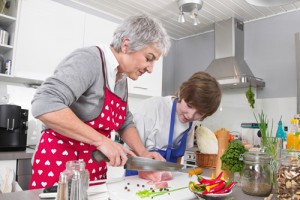According to the Academy of Nutrition and Dietetics, March is National Nutrition Month. You can help a senior loved one celebrate this month by following these tips:
Cook traditional family recipes together
Food plays a major role in people’s memories. Many families have several dishes that they’ve been enjoying for generations. Eating is also deeply rooted in one’s sense of heritage. Where you live, for example, may greatly affect what foods your family frequently makes. If your older loved one cooks, have him or her show you some foods he or she learned from an older relative. This act of passing on wisdom can stir up memories of times long past and make new memories for younger generations. Once you’ve learned a new recipe or two, take a look at the ingredients and see how you can alter them to personalize the dish to fit your diet needs. Substituting olive oil for butter or chicken for pork can improve the health benefits of the food and cut back on unnecessary fats or sugars.
Talk about the senior’s diet
Many people gain weight as they age. Unfortunately this can have serious effects like diabetes and arthritis. Older people sometimes don’t think about what they eat because they feel they deserve that extra dessert or portion at dinner. That mindset can create dangerous habits that hinder their quality of life. Talk with your senior loved one about his or her diet. What does he or she eat on a daily basis? How do these foods make him or her feel? You may even learn of digestive issues you never knew the older person had that should be addressed. Eating too much fiber or too many spicy foods can cause constipation or diarrhea, and prescription medications may also cause unpleasant gastrointestinal side effects. If you have concerns, urge the senior to talk with a dietitian to come up with an eating plan that will alleviate stomach troubles and perhaps help the person lose weight.
Eating to improve your energy levels
Low energy is a frequent complaint of older individuals. While it’s normal to not be as spry and active as you were in your 20s, seniors shouldn’t be spending most of the day in bed. The National Institutes of Health wrote that seniors can increase their energy by eating well. The organization noted the following daily calorie intake recommendations:
- Women over 50 should eat around 1,600 calories a day if they are rarely physically active. Men of a similar activity level should eat between 2,000 and 2,200 per day.
- Women over 50 who are moderately active and walk between 1.3 and 3 miles a day should eat about 1,800 calories. Males should eat around 2,200-2,400 if they are equally active.
- Women who are highly active, walking about 3 to 4 miles per hour for over 3 miles a day, should eat between 2,000 and 2,200 calories every day. Men who get this much exercise should up their intake to between 2,400 and 2,800 daily.
If you found an error, highlight it and press Shift + Enter or click here to inform us.



